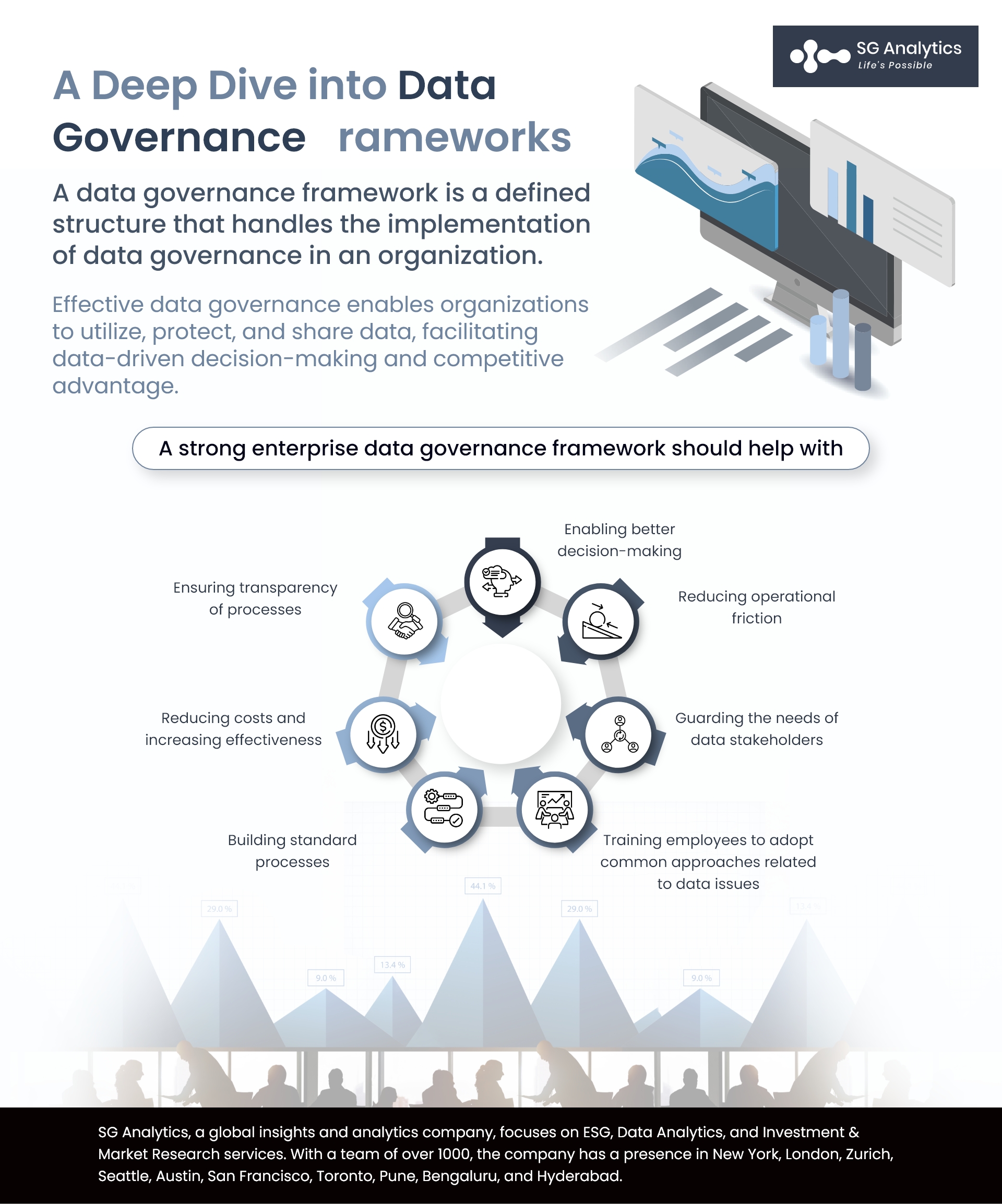The proliferation of big data has proposed multiple avenues for businesses to boost their bottom line. Every organization is positioning itself as “data-driven.” From product innovation to cost optimization, everything is fueled by insights derived from data. Increased data volumes, amplified data consumption needs, and new regulatory frameworks are presenting multiple challenges in their data operations.
Well-managed data helps streamline processes, encourages collaboration, and offers reliable business insights, giving businesses a real competitive edge. It has, therefore, become crucial for organizations to be aware of integrating the right data governance framework to get the most out of the data.
Implementing a successful data governance framework is critical to outline roles and responsibilities and decide which products to adopt to enable the process.
Data Governance Definition
Data governance is all about setting rules to manage organizational data. It helps in addressing data ownership, usage, and quality while also ensuring privacy and security standards. The goal is to make sure organizational data is accurate, consistent, and secure.
A data governance framework presents a set of standards, guidelines, protocols, and rules that help organizations manage their data effectively. Integrating a well-defined framework is critical for data governance initiatives. A data governance framework or a data management framework focuses on using data responsibly and ethically, thereby aligning with the organization’s goals.
Read more: Building an Effective Data Governance Strategy: An Ultimate Guide
Data Governance - Importance
Data governance is responsible for developing and implementing policies and standards for managing data within an organization.
Inconsistent data often leads to bad decisions. Poor data governance can get organizations in trouble with regulators. But with good data governance, organizations can make better decisions, innovate, and increase profits. It’s all about ensuring that the data is accurate and reliable for making smart choices.
Data Governance Frameworks: Benefits
- Compliance with regulatory and industry regulations: Arguably, the focal reason behind organizations developing governance programs is compliance. Minor violations of GDPR or PDPA regulations can lead to hefty fines. With good data governance tools, organizations can enable automated compliance with such regulations and laws.
- Enhanced data quality and reliability: An effective framework will provide decision-makers greater confidence in their data and more confidence in making decisions.
- Effective data collaboration: Setting a clear understanding of who should have access to certain data within the organization will help reduce the friction between data practitioners.
- Cost reduction: Data governance prevents decisions from being made on faulty data. With the right data, audits will be quicker and simpler, making daily operations efficient and productive.

Data Governance Framework - Components
A data governance framework, or a data management framework, is a defined structure that handles the implementation of data governance in an organization. It operates as the foundation of a data governance framework and provides a clear visualization of ensuring the quality, integrity, security, accessibility, and usability of data assets. The data governance framework offers a logical structure for organizing and communicating complex activities involved in making decisions and taking action on enterprise data.
A solid enterprise data governance framework should help with the following:
- Enabling better decision-making
- Reducing operational friction
- Guarding the needs of data stakeholders
- Training employees to adopt common approaches related to data issues
- Building standard processes
- Reducing costs and increasing effectiveness
- Ensuring transparency of processes
Data Governance Frameworks - Types
The framework should reflect the essence of data governance for the modern data stack, enabling organizations to make the data flow traceable and the processes transparent. This will equip them to understand the data operations, improve performance, and achieve set goals. The following three pillars form the crux of every enterprise data governance framework:
- Governance encompassing all data assets
- A bottom-up approach
- Governance practices embedded in every workflow
Read more: Top Data Governance Tools for 2024
From dashboards to data science models and code, every element qualifies as a data asset. The data governance framework should integrate all data assets. With the number of data users and consumers rising, making a few data engineers accountable for data governance isn’t a sustainable approach.
Due to this reason, organizations need to establish a decentralized, bottom-up data management framework to make data creators responsible for data governance. However, each domain follows global rules on data standards, processes, and discovery.
Data governance is associated with compliance, control, and risk mitigation. However, it is a business function to support strategic decision-making and ensure that everyone within the organization can access accurate, high-quality, and trustworthy data. That's why it is critical to be embedded within the daily workflows of data practitioners.

Role of Technology: AI and Data Governance
Today, technology plays a crucial part in data governance through the implementation and maintenance of strategies to manage, protect, and utilize data. Through advanced technologies and tools, they can ensure that the data is stored securely and is also accessible to authorized personnel.
Data governance is emerging as a critical component of digital transformation. It enables organizations to ensure that their data is accurate, reliable, and compliant with industry standards. Data governance equips them with oversight and accountability by specifying policies and guidelines for data management solutions, use, as well as protection. This growing focus on data governance has led to a greater emphasis on ensuring high-quality data. This is further driven by the need for accurate and reliable data to support real-time decision-making.
Organizations are establishing clear data standards and enhancing data privacy and security by implementing robust data governance regulations. The growing advancements also enforce data governance policies and procedures, like data classification and access controls, to ensure compliance across different industry standards and regulatory requirements.
Additionally, IT innovations further assist in conducting regular data assessments to identify and mitigate potential risks or vulnerabilities in the data governance framework. This is instrumental in establishing effective data governance practices in today's evolving digital age.
Read more: The Future of Data Governance: Top Trends to Watch Out For
-
Data Storage and Management
The IT department within any organization is in charge of creating and maintaining reliable data storage and management solutions. This further entails designing databases, data lakes, warehouses, and repositories that align with data governance policies. The IT segment also controls data organization, classification, and storage and complies with data privacy and data governance, along with data retention laws.
-
Monitoring and Auditing
The IT department uses monitoring and auditing to track data usage, modifications, and access patterns. These systems also aid in identifying irregularities, unauthorized activity, and potential compliance violations. Data governance policies can be implemented effectively when they are regularly audited.
-
Data Privacy
The IT department oversees integrating security measures to guard sensitive data against unauthorized access, breaches, and cyber threats. This includes installing access controls, firewalls, intrusion detection systems, and encryption. They further ensure that data governance policies follow set data privacy requirements and other legislations.
-
Data Quality and Integrity
IT systems are critical to preserve data integrity and quality. They employ data validation tests and transformation methods to guarantee that the organizational data is correct and consistent. Automated processes and data quality solutions are integrated to further monitor and enhance data quality.
Read more: Understanding the Difference: Data Governance vs. Data Engineering vs. Data Analysis

Summing Up - Data Governance Framework
The rising digital transformation has led to the creation of numerous opportunities for organizations to utilize their data assets for efficiency and growth. However, organizations must integrate strong data governance practices to benefit from these opportunities. However, implementing a strong data governance framework demands a substantial change in the way organizations create, perceive, and use data.
In 2024, data governance is set to play a critical part in digital transformation as it secures an organization’s data’s accuracy, reliability, and compliance with data security regulations. Effective data governance enables organizations to utilize, protect, and share data, facilitating data-driven decision-making and competitive advantage. Embarking on the data governance journey is vital to setting the foundation and ensuring stability, longevity, and optimal performance.
SG Analytics (SGA) is a global data solutions firm that harnesses data with purpose across the data value chain - from origination, aggregation, management, modernization, and analytics to insights generation to create powerful business outcomes for its customers. Through its research and data analytics consulting services, SGA marries content with context to provide bespoke solutions to its customers, enabling them to improve efficiency, scale, and grow. The company has a presence in New York, London, Zurich, Seattle, Austin, San Francisco, Toronto, Pune, Bangalore, Hyderabad and Wroclaw. The firm serves customers across the banking, financial services and insurance (BFSI), technology, media and entertainment (M&E), and healthcare sectors, amongst others, including Fortune 500 companies.
A leading enterprise in Data Analytics, SG Analytics focuses on leveraging data management solutions, analytics, and data science to help businesses across industries discover new insights and craft tailored growth strategies. Contact us today to make critical data-driven decisions, prompting accelerated business expansion and breakthrough performance.
About SG Analytics
SG Analytics is an industry-leading global insights and analytics firm providing data-centric research and contextual analytics services to its clients, including Fortune 500 companies, across BFSI, Technology, Media and entertainment, and Healthcare sectors. Established in 2007, SG Analytics is a Great Place to Work® (GPTW) certified company and has a team of over 1100 employees and has presence across the U.S.A., the U.K., Switzerland, Canada, and India.
Apart from being recognized by reputed firms such as Analytics India Magazine, Everest Group, and ISG, SG Analytics has been recently awarded as the top ESG consultancy of the year 2022 and Idea Awards 2023 by Entrepreneur India in the “Best Use of Data” category.









